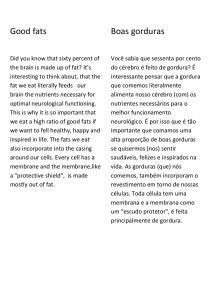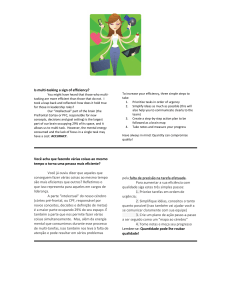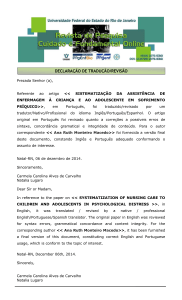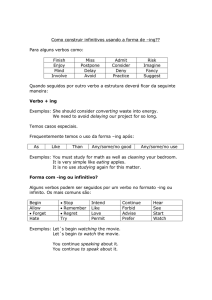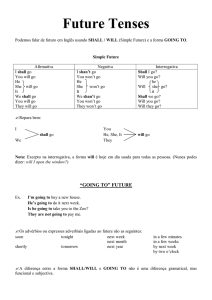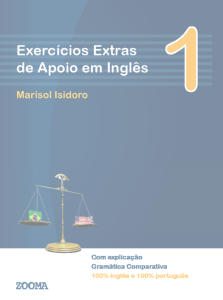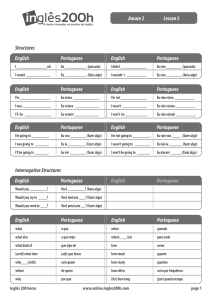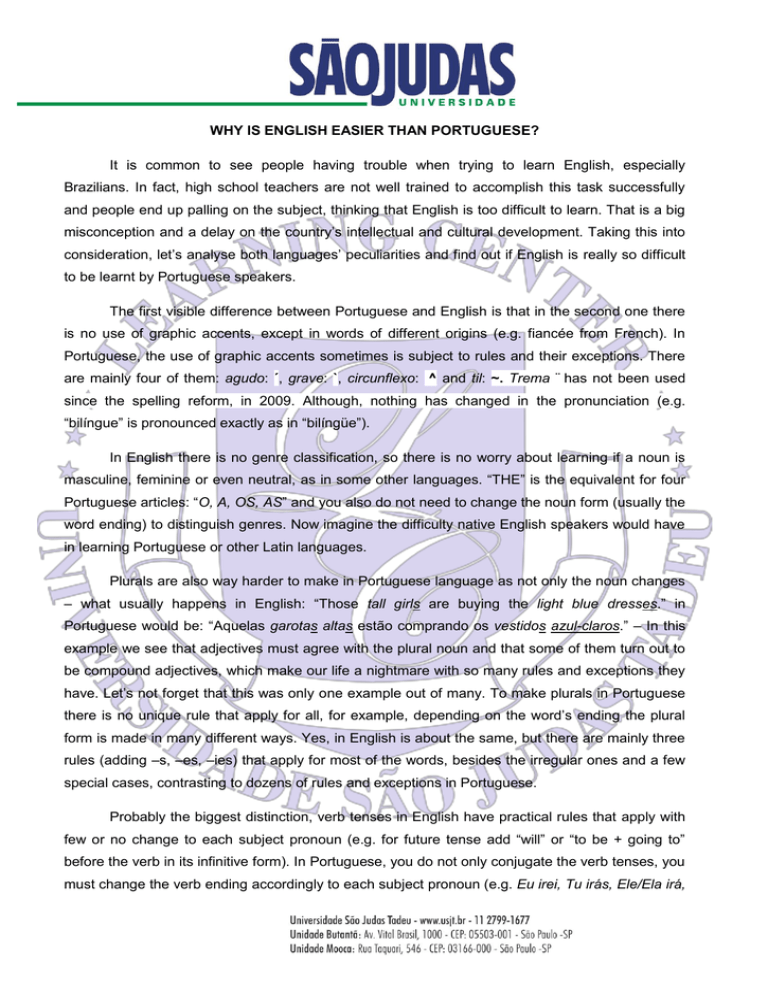
WHY IS ENGLISH EASIER THAN PORTUGUESE?
It is common to see people having trouble when trying to learn English, especially
Brazilians. In fact, high school teachers are not well trained to accomplish this task successfully
and people end up palling on the subject, thinking that English is too difficult to learn. That is a big
misconception and a delay on the country’s intellectual and cultural development. Taking this into
consideration, let’s analyse both languages’ peculiarities and find out if English is really so difficult
to be learnt by Portuguese speakers.
The first visible difference between Portuguese and English is that in the second one there
is no use of graphic accents, except in words of different origins (e.g. fiancée from French). In
Portuguese, the use of graphic accents sometimes is subject to rules and their exceptions. There
are mainly four of them: agudo: ´, grave: `, circunflexo: ^ and til: ~. Trema ¨ has not been used
since the spelling reform, in 2009. Although, nothing has changed in the pronunciation (e.g.
“bilíngue” is pronounced exactly as in “bilíngüe”).
In English there is no genre classification, so there is no worry about learning if a noun is
masculine, feminine or even neutral, as in some other languages. “THE” is the equivalent for four
Portuguese articles: “O, A, OS, AS” and you also do not need to change the noun form (usually the
word ending) to distinguish genres. Now imagine the difficulty native English speakers would have
in learning Portuguese or other Latin languages.
Plurals are also way harder to make in Portuguese language as not only the noun changes
– what usually happens in English: “Those tall girls are buying the light blue dresses.” in
Portuguese would be: “Aquelas garotas altas estão comprando os vestidos azul-claros.” – In this
example we see that adjectives must agree with the plural noun and that some of them turn out to
be compound adjectives, which make our life a nightmare with so many rules and exceptions they
have. Let’s not forget that this was only one example out of many. To make plurals in Portuguese
there is no unique rule that apply for all, for example, depending on the word’s ending the plural
form is made in many different ways. Yes, in English is about the same, but there are mainly three
rules (adding –s, –es, –ies) that apply for most of the words, besides the irregular ones and a few
special cases, contrasting to dozens of rules and exceptions in Portuguese.
Probably the biggest distinction, verb tenses in English have practical rules that apply with
few or no change to each subject pronoun (e.g. for future tense add “will” or “to be + going to”
before the verb in its infinitive form). In Portuguese, you do not only conjugate the verb tenses, you
must change the verb ending accordingly to each subject pronoun (e.g. Eu irei, Tu irás, Ele/Ela irá,
Nós iremos, Vós ireis, Eles/Elas irão – In English: I will, You will, He will, She will, It will, We will,
You will, They will). There are various rules to be applied for this changing: firstly, based on the
verb ending in its infinitive form that can be mainly –AR, -ER, -IR (-OR is a special case where all
verbs with this ending are derived from the verb PÔR – or put, in English), and of course, there are
a list of irregular verbs that change even more when conjugated, many times they are completely
different from their infinitive form and may not even keep their radicals. Another curiosity is that
there are more verb tenses in Portuguese than in English, but natives do not use all of them, as
well as the use of “TU” and “VÓS” is quite archaic and has been substituted by “VOCÊ” and
“VOCÊS”, so most part of the Brazilian population do not even know how to conjugate verbs using
these subject pronouns.
Remember learning how to separate syllables at a very young age in Primary School? And
all those rules taught in songs and stories saying that the “R’s” and “S’s” cannot be together
because they fight? What about diphthongs? Hiatuses? Wouldn’t’ be easier to just write the word in
the next line? In English, syllables are separated by the vowel sounds the word has (e.g. more = 1
syllable, a-gain = 2 syllables, re-ve-nue = 3 syllables). Even having an easier system to separate
syllables, when writing in English it is preferable not to “break” the word in two and simply start it in
the next line. Piece of cake, huh?
Writing in English is also easier: more full stops, less commas so less complex subordinate
clauses. Brazilians may find hard to write essays in English because they already have some
difficulty in doing it in their native language. Evidently, the power of a perfect piece of writing in
Portuguese is in how well the writer manages subordinate clauses, among other things such as
vocabulary choice, coherence, cohesion and other aspects that are important in any other
language. So hold on the commas and be simply more direct with your ideas.
In addition, Brazil is a big country, so we have a significant number of
different accents and dialects; it may be very hard for someone from the north to understand
someone from the south and vice versa. English spoken in the UK, United States or Australia may
differ on accent and some vocabulary as well. Indeed, it is easier for an Australian to understand
an American than it can be for people from different parts of Brazil to understand each other. Of
course this is quite relative and also depends on which part of their country they are, if they are
educated etc. Besides all the differences, English speaking countries keep their language grammar
the same; Portuguese from Portugal, on the other hand, is different not only in accents and
vocabulary, but in syntax as well.
Finally, English is everywhere: on the Internet, on TV, on the radio, in the streets, at school,
at shops etc. There are plain of tools you can use to practice your English nowadays so there is no
excuse to say it is too hard to learn!
Caroline Lopes Bernardino de Lima
Curso de Letras, Tradutor e Intérprete
3 ALEN, 2014
POR QUE INGLÊS É MAIS FÁCIL QUE PORTUGUÊS?
É comum encontrar pessoas com dificuldades para aprender Inglês, principalmente no
Brasil. De fato, professores do ensino fundamental e médio não têm as habilidades necessárias
para ensinar a língua com sucesso e, deste modo, acabam tirando o interesse dos jovens que
passam a acreditar que o Inglês é muito difícil de aprender. Isso é um grande engano e também
um atraso no desenvolvimento intelectual e cultural do país. Levando isto em consideração,
vamos analisar algumas peculiaridades das duas línguas e apurar se Inglês é realmente tão difícil
de ser aprendido por falantes nativos de Português.
A primeira diferença visível entre o Português e o Inglês é a ausência de acentos gráficos
na última, exceto em palavras de outras origens (ex. fiancée, do Francês). Em português, o uso de
acentos gráficos costuma estar sujeito a regras e exceções. Os quatro mais usados são: agudo: ´,
grave: `, circunflexo: ^ e til: ~. O trema ¨ deixou de ser usado desde a reforma ortográfica, em
2009, porém, nada muda na pronúncia (ex. “bilíngue” continua sendo pronunciada como
“bilíngüe”).
Em Inglês não existe flexão de gênero, logo, não há a preocupação em aprender se um
substantivo é masculino, feminino ou mesmo neutro como em algumas outras línguas. “THE” é
equivalente a quatro artigos no Português: “O, A, OS, AS” e também não há a necessidade de
mudar a forma dos substantivos (normalmente o final da palavra) para diferenciar gêneros. Agora
imagine a dificuldade que pessoas que tem o Inglês como primeira língua teriam para aprender
Português ou outras línguas de origem latina.
A flexão de plural também é muito mais difícil de fazer em Português, já que não é
somente o substantivo que muda – como acontece no Inglês: “Those tall girls are buying the light
blue dresses.” Em Português seria: “Aquelas garotas altas estão comprando os vestidos azulclaros.” – Neste exemplo vemos que os adjetivos devem concordar com o substantivo no plural e
que alguns deles podem se tornar adjetivos compostos, o que torna nossa vida um pesadelo com
tantas regras e exceções. Não vamos esquecer que este foi apenas um exemplo dentre muitos.
Para fazer o plural em Português não há uma regra única que valha para tudo, dependendo do
final da palavra, por exemplo, o seu plural deve ser feito de uma maneira específica. Sim, em
Inglês também é mais ou menos assim, porém há três regras principais (adicionar –s, –es, –ies)
que se aplicam na maioria das palavras, exceto as irregulares e alguns poucos casos especiais,
contrastando com dezenas de regras e exceções que há em Português.
Provavelmente a maior diferença, os tempos verbais em Inglês têm regras práticas que se
aplicam com pouca ou mesmo nenhuma mudança de acordo com os pronomes pessoais (ex. para
formar o futuro use “will” ou “to be + going to” antes do verbo no infinitivo). Em Português, não é
necessário apenas conjugar os verbos, mas também deve-se mudar sua terminação de acordo
com cada pessoa (ex. Eu irei, Tu irás, Ele/Ela irá, Nós iremos, Vós ireis, Eles/Elas irão – Em
Inglês: I will, You will, He will, She will, It will, We will, You will, They will). Existem várias regras
que devem ser aplicadas nessa mudança: primeiro, com base na terminação do verbo no infinitivo
que pode ser basicamente –AR, –ER, –IR (–OR é um caso especial em que todos os verbos com
essa terminação são derivados de pôr), e claro, uma lista de verbos irregulares que mudam mais
ainda quando conjugados, muitas vezes diferem completamente de suas formas no infinitivo,
sequer mantendo seus radicais. Outra curiosidade é que existem mais tempos verbais no
Português que no Inglês, porém os próprios nativos não usam todos eles, assim como o uso de
“TU” e “VÓS” que já é considerado arcaico e tem sido substituído por “VOCÊ” e “VOCÊS”, deste
modo, uma grande parte da população brasileira sequer sabe conjugar seus verbos usando esses
pronomes pessoais.
Lembra-se de quando aprendeu a separar sílabas no primário? E todas aquelas regras
ensinadas em musiquinhas e historinhas que diziam que “R’s” e “S’s” não podiam ficar juntos
porque brigavam? E os ditongos? Hiatos? Não seria mais fácil escrever logo a palavra na linha
seguinte? Em Inglês, as sílabas são separadas de acordo com a quantidade de sons vocálicos da
palavra (ex. more = 1 sílaba, a-gain = 2 sílabas, re-ve-nue = 3 sílabas). Mesmo tendo um sistema
mais simples para separar sílabas, é preferível que as palavras simplesmente sejam escritas na
próxima linha. Moleza, né?
Escrever em Inglês também é mais fácil: mais pontos finais, menos vírgulas, logo, menos
orações subordinadas complexas. Brasileiros costumam achar difícil redigir textos na língua
inglesa mas isso deve-se ao fato de já terem certa dificuldade para escrever textos na própria
língua. Evidentemente, o segredo para uma redação perfeita em Português está no quão bem o
autor domina orações subordinadas, em combinação, claro, com a escolha correta de vocabulário,
coerência, coesão e todos esses outros aspectos que são importantes em qualquer outro idioma.
Então segure a tentação de usar vírgulas o tempo todo e seja mais simples e direto na hora de
expor ideias.
O Brasil é um país grande e, por isso, tem um número significante de diferentes sotaques e
dialetos; pode ser extremamente difícil para alguém do nordeste entender alguém do sul e vice
versa. O Inglês Britânico, Americano e Autraliano, por exemplo, difere em sua pronúncia e
vocabulário, principalmente. Entretanto, é mais fácil para um Australiano entender um Americano
que para pessoas de diferentes regiões brasileiras se entenderem. Claro que há uma certa
relatividade em tal afirmação: o nível de entendimento pode depender da região de origem da
pessoa, e ainda, do grau de escolaridade. Apesar de todas as diferenças, países de língua inglesa
mantém a mesma estrutura gramatical, já o Português de Portugal é diferente não só em sotaques
e vocabulário, mas sintaticamente também.
Finalmente, Inglês está em todo lugar: na Internet, na televisão, no rádio, nas ruas, nas
escolas, no comércio etc. Existem inúmeras ferramentas que podem ser usadas para sua prática,
logo não há desculpa para dizer que é um idioma muito difícil de aprender!
Caroline Lopes Bernardino de Lima
Curso de Letras, Tradutor e Intérprete
3 ALEN, 2014



